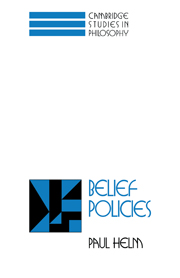Book contents
4 - Belief-policies: some alternatives
Published online by Cambridge University Press: 22 August 2009
Summary
It should be re-emphasised that the belief-policies to be considered are all policies regarding the formation of beliefs about matters of fact either wholly or partly on evidence. So policies about metaphysical truths and ends other than the acquisition of true beliefs and the elimination of error by reference to evidential considerations fall outside the scope of this chapter.
LOCKE ON BELIEF
J. A. Passmore has shown that for John Locke belief is voluntary at least to this extent, that according to him a person may choose whether to examine the evidence, or expose himself to the evidence, or not, but that once the choice is made then the resulting belief will be determined by that evidence (Passmore, 1978). That is, candidly choosing to examine the evidence is being committed to giving minimal assent to whatever proposition the evidence favours.
As Knowledge, is no more arbitrary than perception, so, I think, Assent is no more in our Power than Knowledge. When the Agreement of any two Ideas appears to our minds, whether immediately, or by the Assistance of Reason, I can no more refuse to perceive, no more avoid knowing it, than I can avoid seeing those Objects, which I turn my Eyes to, and look on in day-light: And what upon full Examination I find the most probable, I cannot deny my Assent to … Yet we can hinder both knowledge and assent, by stopping our Enquiry, and not employing our Faculties in the search of any truth. If it were not so, Ignorance, Error or Infidelity could not in any Case be a Fault. […]
- Type
- Chapter
- Information
- Belief Policies , pp. 85 - 112Publisher: Cambridge University PressPrint publication year: 1994



